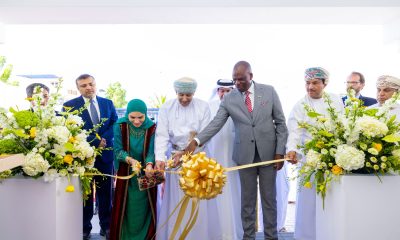Featured
Qatar to Leave OPEC

Qatar, a member since 1961, is leaving OPEC next month to focus on its liquefied natural gas production, Energy Minister Saad Sherida Al-Kaabi told a news conference in Doha on Monday. He didn’t mention the political backdrop to the decision: dire relations with Saudi Arabia, which has led a blockade against his country since 2017; and a rhetorical onslaught from U.S. President Donald Trump against the cartel.
“The symbolism is profound,” said Helima Croft, commodities strategist at RBC Capital Markets LLC and a former analyst at the Central Intelligence Agency. “Given that the concentrating on LNG should not be incompatible with OPEC membership, the move will invariably lead many to conclude that the geopolitical divisions had become too intractable.”
A spokesman for the Organization of Petroleum Exporting Countries declined to comment.
Qatar is OPEC’s 11th-biggest oil producer, accounting for less than 2 percent of total output, so its departure may not have a significant impact on discussions this week to cut production in conjunction with allies including Russia. Yet it sets a troubling precedent for a group that prides itself on putting shared economic interests above external politics — even extreme events like the Iran-Iraq war in the 1980s or Saddam Hussein’s 1991 invasion of Kuwait.
“Quitting OPEC is largely symbolic for Qatar,” said Amrita Sen, chief oil analyst at consultant Energy Aspects Ltd. in London. “Its oil production has been steady with limited prospects for increases.”
Qatar is a minnow in oil and a giant in natural gas. Counting both its production of crude and condensate — a form of ultra-light oil — the nation pumps about 1 million barrels a day, less than a 10th of Saudi Arabia’s output. In the 2016 production-cuts deal between OPEC and non-members including Russia, Qatar made a reduction of 30,000 barrels a day, just 1.7 percent of the total.
Add in natural gas, supplied to its neighbors by pipeline and globally as LNG, and the nation’s output rises to the equivalent of 4.8 million barrels of oil a day, with plans to expand that to 6.5 million, according to Al-Kaabi.
“Achieving our ambitious strategy will undoubtedly require focused efforts, commitment and dedication to maintain and strengthen Qatar’s position as the leading LNG producer,” Al-Kaabi said in a statement. “I would like to reaffirm Qatar’s pride in its international standing at the forefront of natural gas producers, and as the biggest exporter of LNG.”
Frayed Relations
Relations within OPEC are sometimes frayed and observers have often speculated that the group could fracture. Yet oil ministers from Iran and Iraq continued to attend the same meetings even as their nations fought a bloody war that included the use of chemical weapons.
In the mid-1990s, Venezuela appeared at times on the brink of pulling out. Some U.S. right-wing politicians also tried to convince Iraq to withdraw after the 2003 invasion, but Baghdad resisted the pressure. Iran and Saudi Arabia have been bitter regional rivals for many years, backing opposite sides in civil wars in Syria and Yemen, but have still been able to negotiate compromises within the group’s Vienna headquarters.
In the history of the cartel, three nations have left the organization, although two later re-joined. Most recently, Indonesia suspended its OPEC membership because its status as a net importer of oil made joining the 2016 production cuts impractical.
Founding Nations
Qatar was the first country to join OPEC after the five founding nations — Iran, Iraq, Kuwait, Saudi Arabia and Venezuela — formed the group in 1960. It’s the first Middle Eastern nation to leave the group.
Its departure comes amid a standoff between Gulf Arab nations. A Saudi-led coalition implemented a blockade on Qatar in June last year, severing diplomatic, trade and transport links as they accused Doha of funding extremist groups and being too close to Iran.
-

 Banking & Finance4 weeks ago
Banking & Finance4 weeks agoOman Oil Marketing Company Concludes Its Annual Health, Safety, Environment, and Quality Week, Reaffirming People and Safety as a Top Priority
-

 News2 months ago
News2 months agoOIG Appoints New CEO to Lead Its Next Chapter of Excellence
-

 News2 months ago
News2 months agoReport: How India & The Middle East Are Exploiting Immense Economic Synergies
-

 Uncategorized2 months ago
Uncategorized2 months agoOman’s ISWK Cambridge Learners Achieve ‘Top in the World’ and National Honours in June 2025 Cambridge Series
-

 Trade2 months ago
Trade2 months agoConsulate Office of the Republic of South Africa opens in Muscat, enhancing bilateral relations
-

 Economy1 month ago
Economy1 month agoPrime Minister of India Narendra Modi to Visit the Sultanate of Oman on 17-18 December
-

 News4 weeks ago
News4 weeks agoJamal Ahmed Al Harthy Honoured as ‘Pioneer in Youth Empowerment through Education and Sport’ at CSR Summit & Awards 2025
-

 News1 month ago
News1 month agoIHE Launches Eicher Pro League of Trucks & Buses in Oman



























You must be logged in to post a comment Login